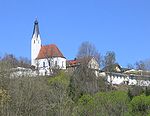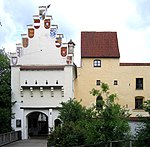The Federal Intelligence Service (German: Bundesnachrichtendienst; German pronunciation: [ˌbʊndəsˈnaːχʁɪçtnˌdiːnst], BND) is the foreign intelligence agency of Germany, directly subordinate to the Chancellor's Office. The BND headquarters is located in central Berlin and is the world's largest intelligence headquarters. The BND has 300 locations in Germany and foreign countries. In 2016, it employed around 6,500 people; 10% of them are military personnel who are formally employed by the Office for Military Sciences. The BND is the largest agency of the German Intelligence Community.
The BND was founded during the Cold War in 1956 as the official foreign intelligence agency of West Germany, which had recently joined NATO, and in close cooperation with the CIA. It was the successor to the earlier Gehlen Organization, often known simply as "The Organization" or "The Org", a West German intelligence organization affiliated with the CIA whose existence had not been officially acknowledged. The most central figure in the BND's history was former Wehrmacht general Reinhard Gehlen, the leader of the Gehlen Organization and later the founding president of the BND, who was regarded as "one of the most legendary Cold War spymasters." From the early days of the Cold War the Gehlen Organization and later the BND had an intimate cooperation with the CIA, and often was the western intelligence community's only eyes and ears on the ground in the eastern bloc. The BND is also regarded as one of the best informed intelligence services in regards to the Middle East from the 1960s. The BND was quickly established as the western world's second largest intelligency agency, second only to the CIA. Both Russia and the Middle East remain important focuses of the BND's activities, in addition to violent non-state actors.
The BND today acts as an early warning system to alert the German government to threats to German interests from abroad. It depends heavily on wiretapping and electronic surveillance of international communications. It collects and evaluates information on a variety of areas such as international non-state terrorism, weapons of mass destruction proliferation and illegal transfer of technology, organized crime, weapons and drug trafficking, money laundering, illegal migration and information warfare. As Germany's only overseas intelligence service, the BND gathers both military and civil intelligence. While the Strategic Reconnaissance Command (KSA) of the Bundeswehr also fulfills this mission, it is not an intelligence service. There is close cooperation between the BND and the KSA.
The domestic secret service counterparts of the BND are the Federal Office for the Protection of the Constitution (Bundesamt für Verfassungsschutz, or BfV) and 16 counterparts at the state level Landesämter für Verfassungsschutz (State Offices for the Protection of the Constitution); there is also a separate military intelligence organisation, the Militärischer Abschirmdienst (MAD, Military Counterintelligence Service).









